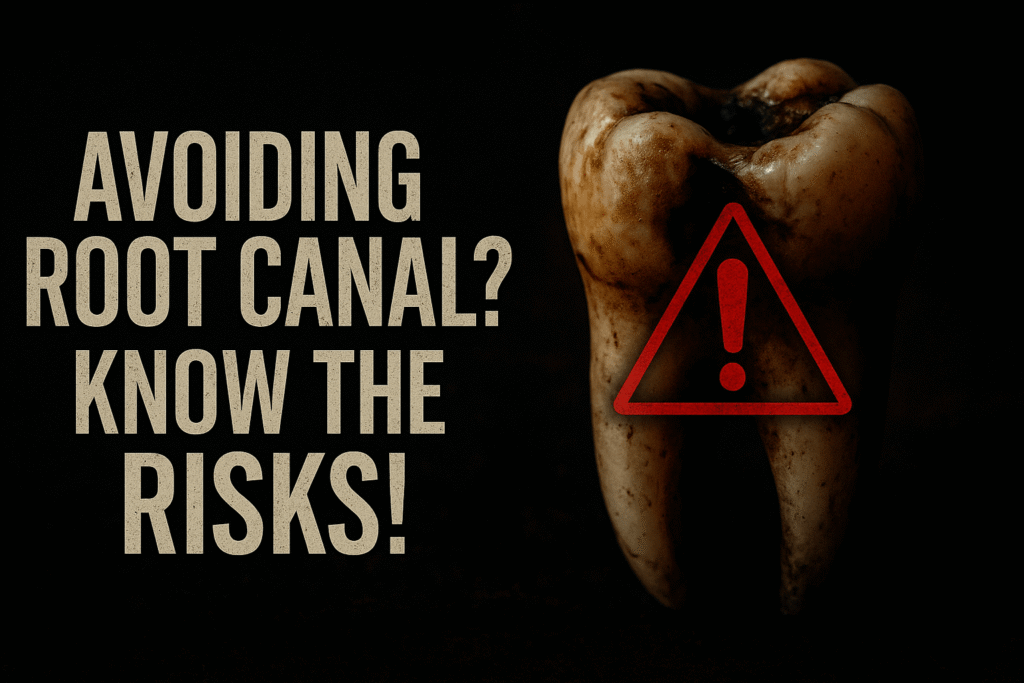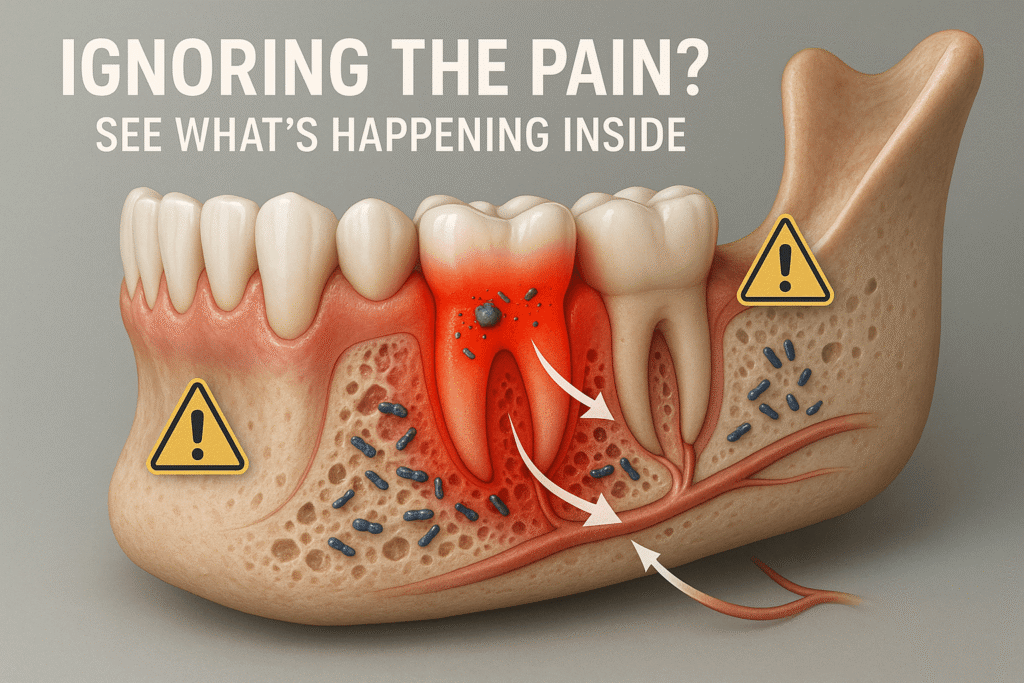
Delaying dental care might seem harmless at first, especially when the pain starts off mild. But based on my experience, toothaches that feel just throbbing one day can become a serious issue the next. Avoiding a root canal when it’s truly necessary can lead to persistent problems that impact not only your oral health but your overall health as well.
This isn’t just about teeth—dental problems are deeply linked to your well-being. As this guide explains, the significance of early action is huge. If you ignore symptoms and continue to put off treatment, the consequences may include damage that could have been avoided with a timely procedure. The goal here is to help you understand the importance of acting sooner, not later, and to explore your options for managing any anxiety you might feel. So if you’re hesitant, keep reading — this article will walk you through what happens when you skip what’s meant to save your tooth.
What is a Root Canal?
A root canal is a dental procedure used to treat a tooth when the damage goes deep into the inner chamber. This part of the tooth holds soft tissue called the dental pulp, which includes blood vessels and nerves that help sustain the tooth. When this area becomes infected, the only way to save the tooth is by removing the pulp and carefully cleaning out the space.
From my experience in dental care, once the space is cleaned, it’s sealed with a filling or replacement material to avoid further infection. In most cases, a crown is then placed over the tooth to protect it and support the remaining structure down to the root. This treatment doesn’t just fix the issue — it helps preserve your natural tooth, which is always the better choice when possible.
How Root Canal Treatment Has Evolved Over Time
In the late 19th century, root canal treatments were often met with skepticism and fear due to the limitations of early dental techniques and lack of effective anesthesia. The goal back then was to remove infected or inflamed pulp tissue from the interior of a tooth to preserve its structure and alleviate pain. However, these methods were quite rudimentary, leading to a generally negative view of the procedure.
Today, the contemporary practice of root canal therapy is nothing like its historical counterpart. Thanks to modern endodontics, a specialized field focused on the study and treatment of dental pulp and periapical tissues, we now use precise diagnostic tools and refined methodologies. Digital radiography provides clear imaging, and anesthetic techniques improve patient comfort.
In my practice, I’ve seen how specialized instruments allow for efficient removal and thorough disinfection, making these procedures far more predictable. With high success rates, reduced discomfort, and more positive experiences, root canals today are a world away from the outdated approaches of the past.
When Does a Root Canal Become Necessary?
Inside each tooth is a soft tissue core called the pulp, made up of nerves and blood vessels that keep the tooth alive and help you feel hot or cold. When deep decay, a fractured tooth, or repeated dental procedures cause damage, the pulp can become infected or inflamed, leading to a painful toothache or a condition known as pulpitis — a type of dental pulp infection I’ve seen many times in patients who delayed care.
In these cases, a root canal treatment is the best solution. It removes the infected soft tissue, cleans the canals inside the tooth’s root, and seals the space with a filling. This not only saves the natural tooth but also allows you to chew comfortably and maintain a healthy smile without ongoing pain.
What You Risk by Ignoring Root Canal Treatment

If you’re ignoring a root canal, thinking the discomfort will pass, you might be putting your health and smile at serious risk. Based on what I’ve seen in dental practice, here’s what can happen if you avoid this important procedure:
-
Increased pain: The infected tooth often already hurts, and the pain will only increase without treatment.
-
Spread of infection: Bacteria can spread from the tooth to surrounding tissues, gum tissue, jawbone, and even your bloodstream, letting it enter your body and travel further.
-
Severe health issues: Infections may cause severe health issues like fatigue or illness, and in rare cases, may even link to complications such as bone loss or systemic problems.
-
Tooth loss: When the damage is too much, the tooth can’t be saved and may need to be extracted.
-
Abscess formation: An untreated infection can cause an abscess, a pocket of pus that’s extremely excruciating and might require surgery.
-
Damaged tissues and future costs: The longer you wait, the more likely you’ll face complicated and costly future treatments involving other teeth, affected areas, or full tooth loss.
-
Negative consequences of delay: Simply delaying treatment or not following what your dentist recommends increases risk and leads to negative consequences.
-
Essential to act promptly: From experience, I always tell patients it’s essential to take action early to avoid worsening their condition.
Common Reasons Why Patients Delay Root Canal Treatment
-
Dental anxiety: Many people suffer from fear of dental visits, which prevents them from seeking timely care.
-
Believing myths: Some still think root canals or dental implants are always painful or lengthy, but modern techniques and local anesthesia make it much easier.
-
Sedation options: Many are unaware that clinics now offer sedation options to help patients relax through the process.
-
Financial hardship: The lack of insurance or high out of pocket costs can create a financial burden. That’s why we always discuss financing options to make dental care more affordable.
-
Less than an hour: A lot of people are surprised to learn the procedure takes less than an hour in most cases.
These fears are common, but with the right support, patients can move past them and get the care they truly need.
Simple Ways to Feel More Comfortable Before a Root Canal
Dental anxiety is very common, especially when it comes to procedures like root canals. From my experience, many patients feel better once they know there are easy ways to reduce stress and feel more comfortable before and during treatment. Here are some helpful options:
-
Sedation dentistry: Most clinics offer sedation options like nitrous oxide (laughing gas) or oral sedatives to help you relax throughout the appointment.
-
Open communication: Talk to your dentist about your concerns. They can walk through each step so you know what to expect, which really helps alleviate fear.
-
Distraction techniques: Some clinics offer music, TV, or other distractions to take your mind off the procedure.
-
Breathing exercises: Practicing breathing techniques can keep you calm and focused before and during the visit.
These simple steps have helped many of my anxious patients feel more at ease, and they can help you too.
Are There Other Ways to Treat a Damaged Tooth?
In some cases, if the pulp isn’t yet infected or inflamed, there may be alternatives to a root canal. But once the infection has reached the pulp and is untreated, it will only worsen the problem.
Alternative treatments like removing decay and placing a filling might be an option in early stages, but they won’t help if the damage is already deep. I always tell my patients that the sooner we act, the better the outcome.
Why Acting Early Makes a Big Difference
Based on my experience, identifying a dental issue sooner leads to a much better outcome. Here’s why early diagnosis and treatment are so crucial if you want to avoid more serious problems:
-
Prevents tooth loss and can save your natural tooth from extraction or invasive procedures.
-
Stops infection spread by addressing the disease early before it reaches other body parts.
-
Leads to less pain, avoids severe pain, and makes it easier to manage any discomfort.
-
It’s more cost-effective, since early intervention avoids expensive treatments later.
-
Regular routine dental check-ups and timely procedures help you steer clear of costly, complicated dental work in the future.
Final Thoughts
Delaying or avoiding a root canal might seem like a small decision, but it can lead to bigger dental and health problems down the line. Acting sooner with the right treatment not only prevents serious complications but also helps you save your natural tooth, avoid pain, and reduce long-term costs. If your dentist recommends a root canal, it’s because it’s the best option to protect both your oral and overall well-being.



